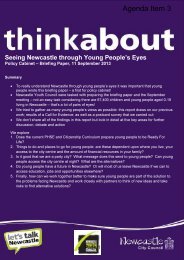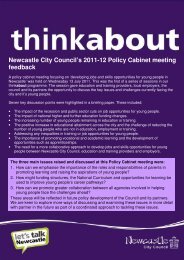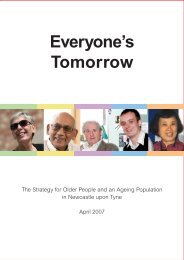NEWCASTLE'S MUSICAL HERITAGE AN INTRODUCTION By ...
NEWCASTLE'S MUSICAL HERITAGE AN INTRODUCTION By ...
NEWCASTLE'S MUSICAL HERITAGE AN INTRODUCTION By ...
Create successful ePaper yourself
Turn your PDF publications into a flip-book with our unique Google optimized e-Paper software.
Richter (1808-79), Cantor of the Thomas School and a master on harmonic<br />
theory. It was here he achieved the highest estimation of his art, which for the<br />
rest of his life remained one of his most prominent characteristics. From Leipzig<br />
Rea went to Prague and studied under Alexander Dreyschock (1818-69), pianist,<br />
teacher and composer and considered a rival of Liszt in technical dexterity. In all<br />
Rea spent three years on the Continent. On his return to London he gave a<br />
series of chamber concerts in the Beethoven Rooms and in 1853 was appointed<br />
organist to the Harmonic Union, which had Julius Benedict (1804-85) as its<br />
conductor. In 1856 Rea founded the London Polyhymnian Choir, comprising all<br />
male voices on the same lines as the Cologne Minnersanger Verein in Germany,<br />
which was a great success. Around this time he was also conductor of an<br />
amateur orchestra. In 1858 he took up what was to be his last London<br />
appointment as organist at St Michael’s in Stockwell. In 1860 the Newcastle<br />
Council advertised a post for Council Organist and Rea applied. Although there<br />
were many applicants for the post Rea was so outstanding the others were<br />
immediately dismissed and he got the job.<br />
A brief summary of Rea’s contribution to the history of music in Newcastle,<br />
such as that given in his obituary notice (see below) does not do full justice to the<br />
man but it is impressive nevertheless. As council organist he gave weekly organ<br />
and piano recitals in the Town hall. In 1867 he began a series of choral and<br />
orchestral concerts – over a month at a time- every season for nine years.<br />
Eminent artists were engaged and the most famous works were well performed.<br />
After the collapse of these concerts he gave three subscription concerts annually<br />
that were well supported by leading musical amateurs. At various times he was<br />
organist at St Andrews, St Mary’s (Tyne Dock) and Elswick Road Chapel. He<br />
published a few compositions but they were said to show reserve. His life’s work<br />
was principally educational; he had a music academy on Pilgrim Street where he<br />
taught piano, organ and harmony. In 1886 Durham University conferred upon<br />
him a FCO & Musical Doctorate and in May 1889 he received a public testimonial<br />
in recognition of his services in the cultivation and spread of music in the North of<br />
England. The idea originated with members of Newcastle Amateur Vocal Society<br />
in recognition of his many years as their conductor but it afterwards assumed a<br />
more widely representative character owing to a desire of many friends outside<br />
the circle of the Society to participate in doing honour to an eminent musician<br />
who had done so much for musical culture in the district of his adoption. The<br />
presentation was made by Alderman Jonathan Barker Ellis, who had worked<br />
closely with Dr Rea, as Chairman of the People’s Concerts Committee.<br />
William Rea must have met with some opposition when he first came to<br />
Newcastle from London, not least perhaps from the Phil-Harmonic Society. I can<br />
find no evidence of this but its members would not have taken kindly to this<br />
Londoner with his preference for German music hustling in on their territory,<br />
giving lectures at the Literary and Philosophical Society on Mozart, Beethoven<br />
and Weber, and recitals of modern piano music. The thought of Wagner ringing<br />
out over the Bigg Market must have filled them with horror. Their concerts were<br />
42

















